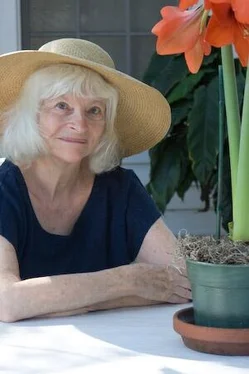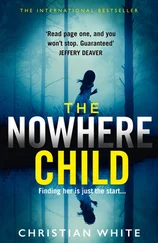“And by that time,” Paul went on, “I’d be settled in and know some people you could meet.” Among any faculty, he reasoned, there would be a proportion that would not only not disapprove of Glory, but would admire him for knowing her.
“Aw, Paul. I d’know.” Glory held one eyelid down while she filled in above it with purple eye-shadow, then with silver. “I mean, sure, I’d like to see the flowers and all. But all those old professors.” Dipping a brush in dark brown liquid, she drew a wide curve above the lashes and out towards the temple. “Y’know, I could never really make that scene.” Glory powdered her lid to set the colors, opened both eyes, and glanced over the shoulder of her reflection at Paul, smiling apologetically. With one eye unpainted, the other metallic purple, she looked grotesque. “Aw, baby,” she added. “You know it was a kooky idea anyhow, ’cause by that time Kay’ll have found out and she won’t want me in the same state with her, forget the same town.”
She means Katherine, Paul thought. “Found out? How’s she going to find out? I’m not going to tell her.”
“You’re not? How come?”
“Huh?”
“I mean, you never tell her we made it together” (Glory began on the other eyelid), “how the hell’s she going to know we paid them back?”
“Paid them back?”
“Yeah. Like we said, your turn my turn; fun for mama; fun for daddy. Boy, are you slow today!” As Glory looked at Paul’s puzzled expression in the mirror, hers also grew puzzled.
“You mean you think your husband has been—” Paul broke off.
“Aw, I know he’s been making out for a long time, ever since he walked out on me. I was all broken up for a while, then I said to myself: He thinks I’m just going to sit around on my ass bawling about it; well, I’ve got better things to do with that piece of equipment.” Glory laughed.
“But you mean you think he’s been making out with—”
“With your wife,” Glory finished. “Yeah.” She began penciling in an eyebrow, then stopped and turned round so as to look at Paul directly. “You mean you didn’t know that? Shit.”
“It’s not true. Who told you?”
“Nobody. I just know, that’s all.”
Paul began to feel better. “Oh, that’s impossible,” he said. In Glory’s world, no doubt such promiscuity was the rule, but not in Katherine’s. “I know Katherine,” he asserted. “She wouldn’t do anything like that. She’s just not the kind of girl that—” He stopped; he had been about to draw a definition insulting to Glory. “How do you just know?”
“From watching her.” Glory began on her eyebrows again, thickening them and extending them up and out like antennae. “The way she says his name, kind of tense, or the way she turns on when somebody else mentions it. Hell, everything.”
“It couldn’t be,” Paul said. He felt much better now. “I mean, she might have a kind of intellectual crush on him, sure. Kind of a hero-worship.”
“Hmh.” Picking up a brush, Glory began to outline her lips, which expressed scepticism. She did not believe him. The cool charm, the modesty of Katherine’s temperament, love without sensual passion, was probably something she had never come across in her life, or even conceived of.
“See, Katherine does get that way sometimes when she’s working for somebody. She really gets to think they’re the greatest living expert in whatever it is they do,” he explained, trying to put it into terms that Glory would understand. “I guess that’s one reason she’s such a good secretary.”
Stretching her lips, Glory filled in the outlines of a sensuous mauve-pink mouth, blotted it on a tissue, threw the tissue onto the floor, and dipped into a box of pink powder.
“Baby,” she said. “You’re living in a little dream world.” For a few seconds she disappeared from Paul in a smog-thick cloud of powder. Then, turning her head, she unknotted the kerchief, pulled it off, and shook out her hair. When she turned back, Paul almost gasped; the nondescript freckled face had turned into a hard mask of unearthly, if vulgar, beauty.
“Yeah,” she said, smiling not so much at him as into the mirror, testing her reflexes. “So listen, I got to get back on stage now; but just hang on, we hafta eat some time.” She stood up and smiled again, more genuinely. Paul understood that she was sorry for having, as she thought, undeceived him. But it was really she who was deceived, living in a dream world—but a vulgar, empty one.
Opening the door to backstage, Glory waved to him; he raised his hand in a half-hearted return. A jangle of trivial dream-music poured in, dimming as the door shut. He looked at the mess of theatrical paint spread out on the dressing-table along with soiled tissues, smudges of powder, and a bottle of tablets—tranquillizers, he realized, picking it up—marked “for nervousness, restlessness, nervous irritability and excitability.” He thought that he ought not to be angry at Glory for her opinion of his wife’s chastity. He should be sorry for her instead, because she was sunk so deep in her shoddy, neurotic world. Paul walked back and forth in the dressing-room. It wasn’t her fault if she figured everyone else was the same—if she thought that every man was on the make, every girl a cheap whore like her—Paul realized that he was angry, very angry. He was suffering from nervousness, restlessness, nervous irritability and excitability.
He went out into the rehearsal hall. Again, the girls were grinning and rotating and high-kicking on stage, their breasts bouncing in unison.
If you want to know the way—
How had he got into this place? He turned, and began to walk towards the exit.
Outside in the hall, an altercation was going on. A middle-aged woman in an unattractive hat was arguing with the doorman.
“Hey, listen,” the man said, stopping Paul. “Maybe you can help this lady; she wants to see Miss Green. I told her already a hundred times she can’t go in.”
“But it’s very important.” The woman turned the screwed-up intensity of her expression on Paul. “I have to speak to Miss Green about my daughter’s screen test. My daughter, Dawn Nefflinger, only she calls herself Bobi Brentwood.” She gave a nervous laugh; her voice trembled with maternal hysteria and anxiety. Paul realized that this must be the mother of the teenager who was bothering Glory.
“I’m sorry, I can’t help you.” He pushed through the swinging doors on to the sidewalk.
The rehearsal hall was at the end of a blind alley. As Paul got to the corner, a sports car drove in: a black Jaguar. He watched it park with a loud squeak of brakes. A bearded man in dark glasses got out. Paul wondered if he hadn’t seen him somewhere; he frowned, trying to remember. No, he hadn’t seen him, he thought, as the man entered the building. He knew him instead from the blurred picture that Glory carried, and from Katherine’s description: it was Dr. Isidore Einsam.
“Have lunch with me,” Iz told Glory, rather than asked her, as the groups of dancers, singers, producers, agents, musicians, and other people connected with the charity show began to break up and move towards the exit. Whether it was the lack of a question in his voice, or just the months of separation, Glory answered flatly.
“I’m not eating lunch today; I hafta take the car to the car wash.” In the state of nervousness into which Iz’s appearance had thrown her, it was the first excuse she could think of. As for Paul, she had completely forgotten about him.
“All right, I’ll come with you.”
Iz took her arm; she let him do so stiffly. Why should I say a nice word to this conceited bastard? her whole attitude seemed to announce as they walked out into the blinding sunlight (goddamn it, she’d forgotten her glasses). What does he think? he turns up out of nowhere after all this time, I’m supposed to throw myself into his arms? She saw Iz’s Jag in the alley, practically underneath a No Parking—No Standing sign, and thought, Hope he gets a ticket.
Читать дальше












